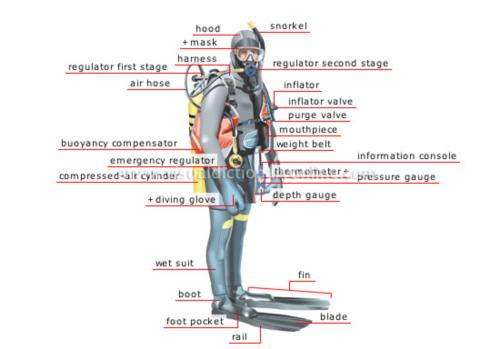
ANNOUNCING ONE OF THE MOST IMPORTANT NEW PADI SPECIALTY COURSES TO BE OFFERED IN MANY YEARS!
PADI SELF-RELIANT DIVER DISTINCTIVE SPECIALTY COURSE
No, this course does not advocate nor promote in any way solo scuba diving! (Diving with a Dive Buddy or Dive Team remains PADI’s highly recommended and safest manner of scuba diving whenever and wherever possible.) Rather, it is an important educational and skill development course which builds upon most of the benefits of the Buddy System while recognizing that there may be circumstances when a diver’s Buddy has,
a) un-expectedly travelled beyond a distance within which a problem can be communicated or,
b) is simply not equipped with the education and/or equipment necessary to provide the help required to resolve the problem or emergency.
Diving without a Dive Buddy, by choice, while not advocated, is something which PADI recognizes to be occasionally either necessary or preferred by some divers. In those circumstances, PADI highly recommends that those divers be fully educated and fully equipped to enable “self-rescue”. A Self-Reliant Diver will be trained according to those practices and standards while, at the same time, acknowledging and accepting that the risk is higher than diving with a Dive Buddy and while accepting full responsibility for the potential developments which might result.
Most recreational divers do not consider themselves as diving without a Dive Buddy. However, the reality is that many divers, knowingly or unknowingly, may find themselves for periods of time without a Dive Buddy to assist in resolving minor or major problems should they occur. Rarely, do most recreational divers have the opportunity to “test” the abilities of their Dive Buddy to respond adequately in the event of an actual emergency requiring their assistance. All divers hope that such a “test” will never take place. Any yet, all divers need to ask themselves if they are prepared for “self-rescue” should it be necessary.
Photographers, spear fisherman, lobster hunters and some other types of divers might easily find themselves distracted by their activities to the extent that they and their Dive Buddy have separated beyond a reasonable distance allowing for assistance to each other. Dive Masters and Instructors should also recognize that in the event that they, themselves, develop a serious problem, their students are not necessarily ready to lend assistance as a Dive Buddy. Are they capable of “self-rescue”?
In other words, having a Dive Buddy ready and able to lend assistance is not guaranteed despite the best of intentions.
All certified divers holding Advanced Open Water Diver Certifications or higher, having logged a minimum of 100 dives, and being 18 years of age or older are eligible to take the PADI Self-Reliant Diver Distinctive Specialty Course. Students must first undergo a “skills assessment” in order to demonstrate a high level of proficiency in basic scuba abilities such as buoyancy and other basic skills learned in the PADI Open Water Diver courses. The course requires that students have an alternative air supply in the form of a pony bottle capable of providing air for the student for a minimum period of two minutes while swimming at depth. Several “redundant” pieces of basic scuba equipment are required in addition to a reel for inflating a lift bag or delayed surface marker buoy (DSMB).
Certification requires the completion of several skills to be performed during three open water dives as well as the completion of a Knowledge Review following a Knowledge Presentation and Discussion session. Learn how to determine your gas consumption rate and how to use it to plan your dives as well as gas cylinder size and pressure requirements.
Students enrolling in the course will be eligible to sit in on the Knowledge Presentation portion of future courses in order to refresh their education of Self-Reliant diving and in order to share their experiences with new students.
A maximum of 8 students will be enrolled in any specific class.